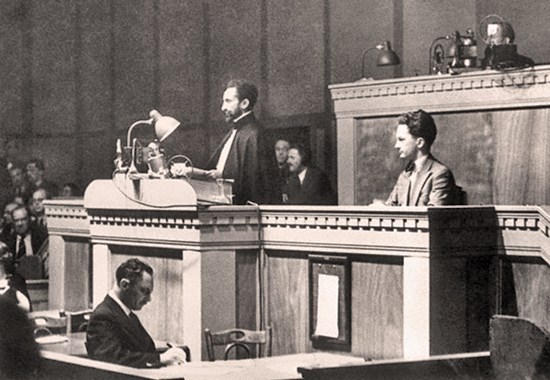The 4 October 1963, Haile Selassie I returned to appear before the plenary session of the United Nations, just as it did in 1936 when he was the first Head of State to stand in front of that podium to alert Europe to the threat of Italian fascism. In this speech, the emperor of Ethiopia again called for world peace, an iconic speech that was later taken by Bob Marley, extracting central part of your message, and translating it into one of his revolutionary classics “War”, from Rastaman Vibrations' s album 1976.
The full speech here:
“Sr. President, distinguished delegates: twenty seven years ago, as Emperor of Ethiopia, I went up to the rostrum in Geneva, Switzerland, to address the League of Nations and request an aid for the destruction that had been unlinked, by the fascist invader, against my defenseless nation. So I spoke to and for the conscience of the world. My words were not heard, but history bears witness to the correctness of the warning I gave in 1936.
Today I stand before the global organization that has succeeded because of the abandoned facade left by its discredited predecessor. The principle of collective security that I invoked in Geneva in vain is protected in this body.. Here, in this assembly, rest the best -perhaps the last- hope for the peaceful survival of mankind. In 1936 I declared that it was not the League Alliance that was at stake, but international morality. Promises, I said then, they are of little value if you lack the will to maintain them.
The Charter of the United Nations proclaims the noblest aspirations of man: renouncing the use of force to resolve differences between states; the guarantee of Human Rights and Fundamental Freedoms for all without distinction of race, sex, language or religion; the protection of international peace and security.
But you are, too, how were the phrases of the Alliance, it was just words; their value depended totally on our will to fulfill and honor them and give them content and meaning.
The preservation of peace and the guarantee of freedoms and basic human rights require courage and continuous vigilance: courage to speak and act - and if necessary, to suffer and die- for truth and justice; continuous surveillance, that even the smallest violation of international morality must be detected and corrected. These lessons must be learned over and over again by each future generation, and that generation is indeed fortunate if it learns from others rather than from its own bitter experience.. This Organization and each of its members has an overwhelming and fearful responsibility: absorb the wisdom of history and apply it to current problems, so that future generations can be born, live and die in peace.
The history of the United Nations during the short years of its existence offers humanity a solid foundation of encouragement and hope for the future.. The United Nations has dared to act, when the League didn't - in Palestine, Korea, Suez and the Congo. Today there is no one among us who does not guess about the reaction of this entity when its motives and actions were questioned.. The opinion of this organization today acts as a powerful influence on the decisions of its members.. The eyes of world opinion, focused by the United Nations on the violations of the renegades of human society, have proven to be, until now, effective protection against rampant aggression and unlimited violation of Human Rights.
The United Nations continues to be a forum where nations whose interests collide, can present their cases to world opinion. It still provides an important exhaust valve without which the slow growth of pressures, for a long time, have resulted in catastrophic explosions. Your actions and decisions have accelerated the success of freedom for many peoples on the Continent of Africa and Asia.. Their efforts have contributed to the improvement of the living conditions of the peoples of all parts of the world..
For this, all men should be grateful. While I'm here today, how weak and distant, are the memories of 1936. How different are they in 1963 men's attitudes. Back then we were in an atmosphere of suffocating pessimism. Today, cautious but triumphant optimism is the prevailing spirit.
But each of us gathered here knows that what has been achieved is not enough. The failures of the United Nations have been and continue to be subject to frustration, as individual Member States have ignored its pronouncements and dismissed its recommendations. The strength of the organization has weakened as Member States have shirked their obligations to it. The authority of the Organization has been ridiculed as Member States have continued, in violation of their mandates, looking for their own goals and ends. The problems that continued to plague us, all apparently arose among Member States of the Organization, but the Organization remains powerless to enforce acceptable solutions. As creator and executor of international law, what the United Nations has achieved, Unfortunately, still does not meet the goals of being an International Community of Nations.
This does not mean that the United Nations has failed.. I have lived too long to harbor many illusions about the essential arrogance of men when they are required an authoritarian confrontation on the issue of control over their security and property rights.. Not even now, when there is so much in danger, nations would voluntarily entrust their destinies in other hands.
But nevertheless, this is the ultimatum that they have presented us: ensure the conditions by which man will entrust his safety to a larger entity, or risk their annihilation; persuade men that their salvation consists in the subordination of local and international interests to the interests of humanity or endangering the future of man. These are the objectives that we should try to achieve, unreachable in the past, today indispensable.
Until we achieve this goal, humanity's future remains in jeopardy and permanent peace a matter of speculation. There is no single magic formula, not a single simple step, no words, either written in the Charter of the Organization or in the treaty between the states, that can automatically guarantee us what we are looking for. Peace is a daily problem, the product of a multitude of events and opinions. Peace is not a "is", is a "to become". We cannot escape the terrible possibility of a catastrophe due to a mistake. But we can make the right decisions in endless subordinate problems, that every new day arise, and in this way we can make our contribution - and perhaps what can be reasonably required of us in 1963 - to preserve the peace.
It is here at the United Nations they have supported us - not perfectly but conveniently. And by improving the possibilities that the Organization provides us with a better service, we serve and move closer to our dearest goals. ”
I will briefly mention today two specific matters that are of deep concern to all men.: military disarmament and the establishment of true equality between men.
Military disarmament has become the urgent mandate of our times, I am not saying this because I compare the absence of weapons with peace, or because I believe that ending the nuclear arms race automatically guarantees peace, o The elimination of nuclear warheads from the world's arsenals will bring in its awakening a change in the attitude of nations and which is a requirement for the peaceful solution of conflicts between nations.. Today, military disarmament is important, something simple, due to the immense destructive capacity available to the peoples.
Since the stone age the production of weapons has always been the source of man's own destruction. Although achieving general and complete disarmament takes a long time, It is encouraging to note that great efforts have been devoted to its achievement..
My country supports the Nuclear Test Ban Treaty as a step towards that goal even if it is only a partial step. The true meaning of the treaty is that it admits a tacit stagnation between the nations that must have created it. A stagnation that recognizes the overwhelming and inevitable fact that no one will emerge from the total destruction that would be the fate of all in the event of a nuclear war. A stalemate that gives us and the United Nations the charm of breathing in which to act.
The goal of the equality of man that we seek is the same antithesis of the exploitation of one people by another on which the pages of history, and particularly on the writings of the African and Asian continents, they speak to us so extensively.
Last May, in Addis Ababa, a meeting of African heads of states and governments was convened. In three days, the thirty-two nations presented at that conference demonstrated to the world that when wills and determination exist, nations and peoples of diverse origins can and will work together in unity in achieving common goals for the guarantee of that equality and brotherhood that we desire.
Although our position is to admit and identify the fact that we have always tried to cooperate with all nations without exception. Thus, one of the fundamental principles that we have agreed at the Addis Ababa summit expresses our fundamental desire to live in harmony and cooperation with all States.
On the issue of racial discrimination, the Addis Ababa Conference taught those who will learn, this additional lesson: Until the philosophy that sustains a superior and inferior race is finally and permanently discredited and abandoned.; until there are no first and second class citizens of any nation.
Until the color of a man's skin is no more important than the color of his eyes. Until basic Human Rights are equally guaranteed to all regardless of race. That until that day, the dream of lasting peace and world citizenship and the rule of international morality, will remain a fleeting illusion, hunted but never reached.
And until the ignoble and unhappy regimes that keep our brothers in Angola, in Mozambique and South Africa and in subhuman servitude have been shot down, destroyed. Until intolerance and prejudice and malicious and inhuman selfishness have been replaced by understanding, tolerance and goodwill. Until all Africans stand up and speak like free human beings, equal in the eyes of all men, as they are in the eyes of heaven; until that day, the African continent will not know peace.
Africans will fight, if required, and we know that we will win, since we trust in the victory of good over evil.
The basis of racial discrimination, colonialism, It has been economic and it is with economic weapons that these evils have been and can be overcome.
In compliance with the resolutions adopted at the Addis Ababa Summit, African States have adopted certain measures in the economic sphere that, if adopted by all member states of the United Nations, they would soon reduce intransigence to reason.
Today I ask that all nations represented here adhere to these measures, who actually adhere to the principles set forth in the Charter. I do not believe that Portugal and South Africa are willing to commit economic or physical suicide if there are honorable and reasonable alternatives. I think those alternatives can be found.
We must act while we can, as long as there is the opportunity to exert the legitimate pressure that we have at our disposal, so that times do not run out and less happy means are used.
The great nations of the world would do well to remember that in modern times not even their own destiny is in their hands.. Peace requires the united effort of all of us. Who can foresee what spark can light the fuse?.
The bets are identical for each of us: Life or death. We all want to live. We all seek a world in which men are free from the burdens of ignorance, poverty, hunger and disease. And we will all be hard pressed to escape the deadly rain of nuclear fall if catastrophe hits us..
The problems we face today are equally unheard of. They have no counterpart in human experience. Men search the pages of history for solutions, precedents, but in the end there are none. This, so, is the final challenge. Where should we seek our survival, the answers to the questions we've never had before?.
We must look first to Almighty God, who has raised man above the animals and endowed with intelligence and reason. We must put our faith in him, so that He will not abandon us or allow us to destroy the human race that He created in His image. And we must look within ourselves, in the depth of our souls.
We must become something we have never been and for which our education and experience and environment have poorly prepared us. We must be bigger than we've ever been: bravest, bigger in spirit and clearer in perspective. We must be members of a new race, overcoming small prejudices, because of our ultimate loyalty, no to stocks, but to our fellow men within the human community”.
Su Majestad Imperial Haile Selassie I
4 October of 1963, NY, U.S.



















